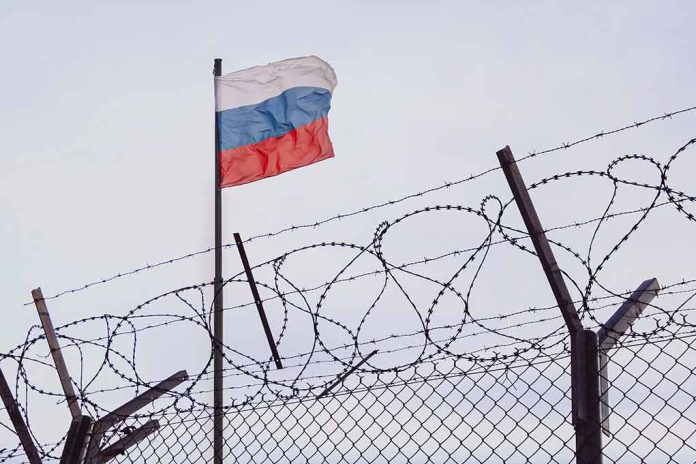
America’s top military official warns that Putin has ambitions beyond Ukraine, directly contradicting Defense Secretary Hegseth’s more ambiguous stance on Russian intentions.
Key Takeaways
- Gen. Dan “Razin” Caine, Chairman of the Joint Chiefs of Staff, explicitly stated he doesn’t believe Putin would stop at Ukraine if successful in conquering it
- Defense Secretary Pete Hegseth gave a notably vague “remains to be seen” response when questioned about Putin’s expansionist intentions
- Sen. Lindsey Graham compared the current situation to the world’s miscalculation of Hitler before WWII, while Sen. McConnell expressed concern about Russia defining victory
- The testimony revealed strategic divisions within America’s defense leadership regarding the assessment of Russian threats
- Ukraine has recently faced what’s described as the largest drone attacks on Kyiv since the war began, highlighting escalating tensions
Military Leaders Split on Putin’s Territorial Ambitions
During a critical Senate Appropriations Subcommittee hearing on Defense on June 11, Gen. Dan “Razin” Caine, Chairman of the Joint Chiefs of Staff, delivered a stark assessment of Vladimir Putin’s geopolitical objectives. When questioned directly by senators about whether the Russian president would be satisfied with just Ukraine, Caine’s response was unequivocal, creating daylight between military leadership and the administration’s diplomatic messaging. This testimony represents one of the most explicit warnings from a senior military official about Russia’s potential threat to NATO’s eastern flank and other neighboring territories.
“I don’t believe he is,” Caine told the Senate Appropriations subcommittee on armed services.
Defense Secretary Pete Hegseth, appearing alongside Caine, offered a markedly different perspective when faced with the same line of questioning from Senator Lindsey Graham. Hegseth’s ambiguous response suggesting Putin’s ultimate goals “remains to be seen” immediately drew criticism from Graham, who pressed for clearer acknowledgment of what he characterized as Putin’s obvious expansionist agenda. The divergent assessments highlight significant differences in threat perception at the highest levels of America’s defense establishment at a critical moment in the ongoing conflict.
Historical Parallels and Congressional Concerns
Senator Graham framed the current situation in historical terms, drawing direct parallels between today’s geopolitical climate and the world’s failure to recognize Hitler’s true intentions before World War II. This comparison underscores growing concern among some lawmakers that a policy of containment or negotiation without full recognition of Putin’s broader objectives could lead to greater regional instability. Graham’s pointed questioning appeared designed to highlight what he perceives as dangerous ambiguity in the administration’s current stance toward Russia’s actions in Ukraine.
“Gen. Dan “Razin” Caine, chairman of the Joint Chiefs of Staff, told senators on June 11 that he does not believe Russian President Vladimir Putin would stop at Ukraine if he succeeds in conquering the country.”
Senate Minority Leader Mitch McConnell added to these concerns by questioning whether current U.S. policy risks allowing “the Russians to define victory.” While acknowledging positive developments in NATO and European defense spending, McConnell emphasized the need to focus on future actions rather than past policies. His comments reflect anxiety among some senators that inconsistency in America’s approach could undermine confidence among Eastern European allies who face potential Russian aggression.
Escalating Tensions and Strategic Challenges
The testimony comes amid alarming developments on the ground in Ukraine, where Russia has dramatically increased drone strikes on civilian targets, including what reports describe as the largest attacks on Kyiv since the conflict began. These escalations suggest Putin may be testing Western resolve and seeking leverage in any potential negotiations. Simultaneously, Ukrainian forces conducted significant drone operations against Russian military facilities, actions that have drawn criticism from some quarters as potentially complicating peace efforts.
“Everybody seems to be moving in the right direction, and they look at us and wonder whether we’re in the midst of brokering what appears to be allowing the Russians to define victory,” said McConnell.
President Trump has expressed frustration with both Russia and Ukraine, comparing their conflict to a schoolyard fight that requires decisive intervention. While promising to end the war quickly, the administration now faces the complex reality of conflicting military and diplomatic assessments regarding Putin’s ultimate objectives. The divergence between Gen. Caine’s clear warning about Putin’s broader ambitions and Secretary Hegseth’s more tentative stance creates significant policy challenges as America attempts to develop a coherent strategy for addressing this evolving threat to European security.







